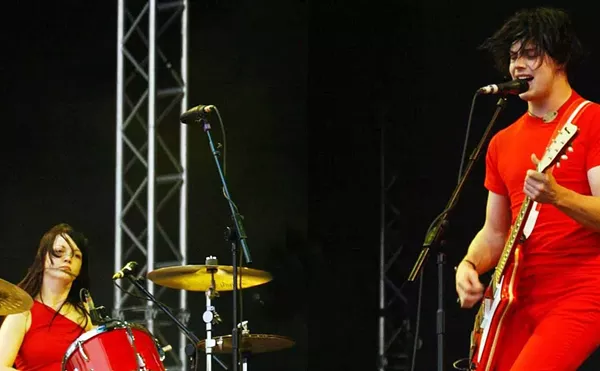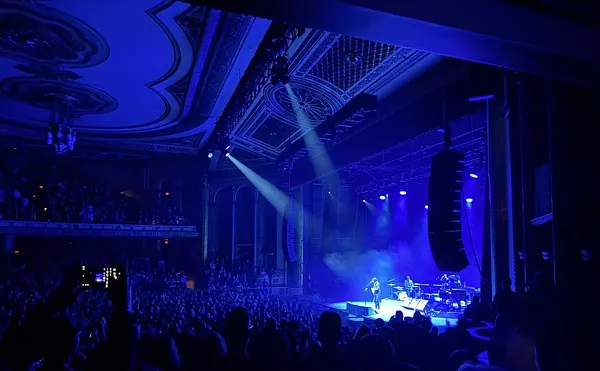
Audio By Carbonatix
[
{
"name": "GPT - Leaderboard - Inline - Content",
"component": "35519556",
"insertPoint": "5th",
"startingPoint": "3",
"requiredCountToDisplay": "3",
"maxInsertions": 100,
"adList": [
{
"adPreset": "LeaderboardInline"
}
]
}
]
England's Chemical Brothers (Tom Rowlands and Ed Simons), two sampling, dance-beat hit-makers from UK alt-music mecca Manchester, seem to have involuntarily inspired this hyped idea of electronic rockicide. And they want nothing of it.
"That reflects the total opposite of the way we think of music," Rowlands said in a phone interview the other day.
Rather than having a master plan for pop domination, the brothers started small.
In 1993 the duo made the transition from club deejaying to vinyl by recording the sample-laden single "Song to the Siren." By the time their groundbreaking techno-rock album Exit Planet Dust (Virgin) was released in 1995, things looked very promising indeed. Their former deejay-booth operation had translated to the mainstream rock circuit (including the United States) with unprecedented ease: hit records, big tours, MTV mania -- the whole shebang.
And with notoriety came the inevitable labels: electronica in the United States, and Brit-hop or Amyl House in Europe. The Brothers embraced none of these, least of all the one with the beglittered nod toward Amyl Nitrate and the club drug scene. Instead they've stayed fresh in a notoriously fickle music environment by staying focused on their craft.
Their bombastic combination of dance music, hip hop and guitar rock, though, simultaneously spans all these genres and transcends them. The bulk of the Chemical Brothers' recorded tracks are made up of a vast cross section of samples from other records, most notably culled hip-hop tracks. Their second full-length record, Dig Your Own Hole (Astralwerks), for example, credits Schoolly D, late '60s psych rockers Lothar and the Hand People, and John Schroeder for a few identifiable aural bits planted in the Brothers' intricate matrix of not-so-identifiable ones.
In the past year, Rowlands says, he and Simons have been asked numerous times (especially in the United States) whether an all-out electronica craze will kill rock 'n' roll.
"We don't want to be held responsible for the death of any musical form," Rowlands said. "Our records are made with a respect for pop music -- with just as much respect for the Beach Boys as Derrick May.
"I think when people listen to our music they can hear elements of, like, '60s psychedelia and '90s psychedelia, not just electronic music. It still has a clear identity. Not just in the samples, but in mood and emotion and something like that."
One might argue that the Chemical Brothers' work is merely a cold dissection and reassembly of a musical cadaver formerly known as the hip-hop (or rock, or funk, etc.) song from which they've methodically dug out desired pieces, turning those into simple raw material.
"The way we sample things, we take building blocks to make something new. But that's influence. That's the way music works, whether it's Paul McCartney, hearing some avant-garde composers or whatever. Most music is secondhand in that way. It comes from something else. But if you do something exciting and innovative with it, that's the difference. No one wants to hear just a simple rehash of something else. People can see if something is just the same old thing dressed up differently."
As unwilling as the Brothers may be to shoulder the electronica genre label, their commercial and critical success does highlight the ever grayer area in pop music between the Chemmies' portable and recordable dance parties and the guitar-slinging shtick offered up by your average hot-selling, touring rock entity. After all, the Brothers play rock venues and sell CDs (lots of them), yet they don't sing or play guitars; there isn't a drum kit to be found on their stage and, as Rowlands puts it, "You get the live show as long as you're standing near a speaker.
"But blues was the raw material for Led Zeppelin to be Led Zeppelin, wasn't it? I don't know if I'm using samples in such a tactile way. Our music is more than the sum of its parts."
Besides, the Chemical Brothers are still party hosts at heart, ever mindful of the emotional impact of their rock-oriented "songs," an attitude which sets them apart from the typical blipping techno head game -- that is, they offer something more than sound effects and an opportunity to count beats per minute. The life and humanity they breathe into the complex electronic arrangements on Dig Your Own Hole -- via appearances by vocalists Noel Gallagher (of Oasis) on "Setting Sun," and British nightingale Beth Orton on "Where Do I Begin?" -- might be the best evidence yet that these machine-music makers can be just as warm-blooded as the next humanoid.
Yet even in the company of borrowed pop stars, the Chemical Brothers aren't your everyday rock band. Their electronic take on organic music seems to come naturally for two blokes who grew up with rapidly advancing technology and fell under the spell of dance luminaries such as Coldcut, Renegade Soundwave and Depth Charge. Feed that into a blaringly obvious admiration for rock, add a lot of innovation and you have the formula that brought the Chemical Brothers to the forefront of pop (first in the U.K. and Europe, but coming soon to a rock house near you).
"We grew up with electronics and organic, acoustic instruments at the same time," Rowlands says. "I think that's somewhere near the foundation of what we do.
"It's beyond just the nuts and bolts of samples. The thing that influences us is the mood of music. Say we're listening to 'Tomorrow Never Knows' by the Beatles. We were playing that in nightclubs, and it's just the most disorientating kind of psychedelic song you'll ever hear. We would never sample the Beatles. But we wanted to get the feel and the same emotional impact that this record has when we were playing in nightclubs.
"From that influence we made 'Setting Sun.' And it wasn't directly sampling someone, but trying to achieve that same effect it had on other people. The same as Keith Richards being influenced by Howlin' Wolf." Norene Cashen writes about music for the Metro Times. E-mail letters@metrotimes.com





